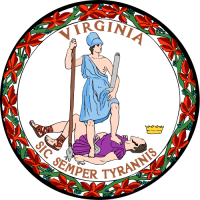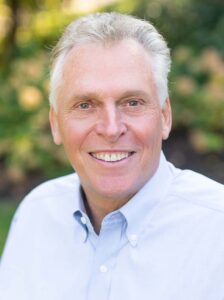
In the open race to serve as Governor of the Commonwealth of Virginia, former Governor Terry McAuliffe (D-VA) faces Glenn Youngkin (R). One minor candidate, Princess Blanding (Liberation), will also be on the ballot. The Constitution of Virginia prohibits governors from serving multiple consecutive terms, so incumbent Governor Ralph Northam (D-VA) is ineligible for reelection.
The office of governor is established by the Constitution of Virginia, and the office holder’s primary duty is to serve as the chief of the commonwealth’s executive branch of government. The governor must report on the state of the commonwealth to the General Assembly, convene the legislature when a special session is called, ensure that state laws are executed properly, and serve as commander-in-chief of the state militia. Additionally, governors have the power to submit recommendations to the General Assembly, veto bills (in whole or in part with a line-item veto), commute fines and issue pardons, and restore rights to convicted felons.
Virginia governors must be at least thirty years old, citizens of the Commonwealth of Virginia, and have been a resident and registered voter in the commonwealth for five years preceding the date of the election. They are elected to four-year terms and there are no term limits, although governors are prohibited from serving consecutive terms. Virginia is the only state in the United States that does not permit governors to stand for reelection.
Major Candidates
Major candidates are defined by Off on a Tangent as those likely to receive at least five percent of the popular vote for an office.
Terry McAuliffe (D)
Former Governor Terry McAuliffe (D-VA) stands as the Democratic Party candidate for Governor of Virginia.
McAuliffe holds a bachelor’s degree from Catholic University and a law degree from Georgetown University. He is an entrepreneur, banker, and businessman. He worked on President Jimmy Carter’s (D) 1980 reelection campaign, served as President Bill Clinton’s (D) 1996 campaign co-chairman, served as chairman of the Democratic National Committee from 2001 to 2005, and was chairman of former Secretary of State Hillary Clinton’s (D) failed 2008 presidential campaign.
In 2013, McAuliffe successfully sought election as Governor of Virginia. He served one term and, because of Virginia’s prohibition on consecutive gubernatorial terms, he was not eligible for reelection. If elected, he would be the first Virginia governor since Mills Godwin (R-VA) to serve two terms; Godwin served one term as a Democrat (1966-1970) and another as a Republican (1974-1978).
Virginia tends toward the center. Even during the years when the state leaned Republican, it usually preferred relatively moderate Republicans. And now that the state is, at least for the time being, leaning Democratic, it prefers moderate Democrats. McAuliffe apparently missed the memo. He was the most left-wing governor we have had in modern history, and he spent most of his time in office thumbing his nose at his own state in a transparent effort to impress the much more radical national Democratic Party.
This revealed a flaw in the commonwealth’s prohibition on consecutive gubernatorial terms. When governors are statesmen who care about the people of Virginia, this gives them a free hand to do what they think is best without the distraction of a reelection campaign. But when our governor is a self-promoting opportunist, it frees him to work against our interests without concern for any immediate electoral consequences.
McAuliffe was a governor in name only; his time in Richmond was merely an extended job interview for his national aspirations. He wasn’t running the state as much as he was running for vice president, with an eye toward the White House sometime after. But the Democratic Party selected a white man for its 2020 presidential nominee, and their idiotic obsession with identity politics meant that they could not select another white man to be his running mate. If a woman or a racial minority had been nominated, McAuliffe likely would have been a top contender for the vice presidency.
So it almost worked, which is probably why he’s doing the same thing all over again. I think he assumes that now-Vice President Kamala Harris (D) will be the party’s presidential nominee in 2024 or 2028, and that he’ll be a shoo-in for the vice presidency if he can get back in the governor’s mansion and maintain a national profile. We’ve seen this movie before. We know that if we elect him governor, McAuliffe’s eyes will be focused across the river in Washington. He will advocate for the hard-left policies that appeal to the national party, not the moderate ones that appeal to Virginians . . . just like he did last time.
He says none of this explicitly, but it’s all there if you read between the lines. Consider this line from his website, describing his time as governor: “Time and again, Terry fought the Republican-led legislature.” Imagine being proud of having fought against a bunch of milquetoast moderates!
McAuliffe does make the usual suite of left-wing promises. He says he’ll fight for civil rights, even as he calls for further undermining the integrity of our elections. He promises more money for our dysfunctional schools (and recently declared, bizarrely, that he doesn’t think parents should have a say in their kids’ education). He uses all the usual identity politics buzzwords—“systemic racism,” “equity,” “inclusivity,” and so on—which are now just a lot of meaningless pabulum. Strangest of all, he barely even addresses the need to improve our highway infrastructure . . . only making vague promises to “decarbonize” our transportation sector and stretching as hard as he can to somehow connect that to racial inequity.
And of course, as a modern Democrat, he talks about justice and a better future even as he openly opposes the human rights to life and to keep and bear arms. The lack of self-awareness is pretty amazing.
Glenn Youngkin (R)
Glenn Youngkin (R) stands as the Republican Party candidate for Governor of Virginia.
Youngkin holds bachelor’s degrees in mechanical engineering and managerial studies from Rice University and a master’s degree in business administration from the Harvard Business School. He worked as a banker with First Boston (later Credit Suisse First Boston) before joining the private equity firm The Carlyle Group in 1995. In twenty-five years at Carlyle, he served as a partner and managing director, member of the operating committee, interim chief financial officer (CFO), chief operating officer (COO), and, ultimately, co-Chief Executive Officer (co-CEO).
He has also served on the boards of several nonprofit organizations, including the Virginia Ready Initiative, Virginia Tech’s Innovation Campus Advisory Board, the Museum of the Bible, and the Meadowkirk Retreat Center. This is Youngkin’s first run for elective office.
Youngkin promises to be “a new type of governor,” and claims that “the political insiders who have been running Virginia have failed us.” He says he will focus on five key areas: Cutting the cost of living, keeping communities safe, invigorating job growth, improving education, and improving government services. Much of this sounds good but, as is too often the case, he provides little detail. The bullet-points seem fine, I guess.
On the cost of living and on job growth, he mainly promises tax cuts. Nothing wrong with that, though I’m not sure what chance those have making it through the General Assembly. He also proposes a one-time tax rebate of $300 per-person, voter approval (presumably by referendum) on property tax increases, and protecting free association rights by opposing forced unionization.
On community safety, Youngkin promises to work to reduce crime by fully funding law enforcement and “fixing our broken mental health system” in some unspecified way. On education, he promises to keep our schools open, get all the postmodern hyper-political nonsense out of the curriculums, and increase education spending, but he does not propose the kind of necessary top-to-bottom reform effort that Virginia needs.
Lastly, Youngkin promises to protect Virginian’s constitutional rights, restore voter ID requirements and take other steps to ensure the integrity of our elections, and invest in roads and highways. Here, too, we are given only the barest of summaries.
So we are forced to fill in the gaps ourselves. We must infer how Youngkin will govern by fleshing-out his sparse outline with the typical policy positions taken by his political party, the track record of other Virginia Republicans, and what we know about Youngkin’s personal history.
We can assume that he is likely to support low-tax, pro-business policies that will be good for Virginia’s economy. He is likely to be better on transportation and education than his main opponent, but still not good enough. He is likely to support efforts to improve election security and reduce election fraud. He is likely to support law and order. And most importantly, he is likely to generally uphold the fundamental human rights—including the right to life and the right to keep and bear arms.
I hate that his campaign materials leave me guessing about so many details. Youngkin says a lot of the right things and makes a lot of the right promises, but they are so thinly described that they are nearly meaningless. For example, he says that he will “make government work by . . . protecting our constitutional rights.” Good. But which rights? Can he list them out for me? How will he protect them? Does he know what the source of those rights is? Does he apply them equally to everybody?
Lots of politicians have sworn to protect and defend the constitution and then immediately set about trampling it. It’s not enough to speak in vague platitudes.
Minor Candidate
Minor candidates are defined by Off on a Tangent as those likely to receive less than five percent of the popular vote for an office.
Princess Blanding (Liberation)
Princess Blanding (Liberation) stands as the Liberation Party candidate for Governor of Virginia.
The newly established Liberation Party describes itself as “an independent party that rebuilds and establishes communities by creating generational wealth, dismantling racist systems, fostering sociocultural enlightenment, and claiming our rightful political positions to ensure Black Liberation.” It will be abbreviated on Virginia ballots as “LP.” It is unrelated to the Libertarian Party, which is abbreviated on Virginia ballots as “L.”
Blanding holds a bachelor’s degree in biology from Morgan State University, a master’s degree in K-12 education, and an educational specialist degree (EdS) in educational leadership. She has worked as a teacher and an assistant principal. In 2018, her brother, Marcus-David Peters, was fatally shot by a police officer while suffering a mental health crisis. In the aftermath, Blanding founded an advocacy group called Justice and Reformation.
The above description of her political party gives you a good idea of what you should expect from Blanding’s campaign. Take the usual modern Democratic Party talking points, shift them a few notches further off the left edge of the scale, and dump in a few tons of misguided race grievance and identity politics. Lovely.
Conclusion
For four years, we have been subject to the rudderless, drifting administration of Governor Ralph Northam (D-VA). He isn’t great, but for all his faults he at least seems to care about the people of the commonwealth. He’s not angling for higher office or trying to impress the members of the Democratic National Committee. He hasn’t gone out of his way to alienate his opposition (although he has occasionally been swept along by the currents within his party).
Don’t get me wrong; I have deep, serious disagreements with Northam on many matters of policy. And it’s clear that he was in way over his head, especially during the COVID-19 crisis. But in some ways he was a breath of fresh air compared to his immediate predecessor.
That predecessor—former Governor Terry McAuliffe (D)—wants another chance. But he is a known quantity. His policy proposals are the typical counterproductive Democratic Party tripe. He openly opposes the fundamental human right to life and the right to keep and bear arms. And for four years, when he should have been serving the interests of the people of the commonwealth, he was chasing his national political future. If we send him back to Richmond, he will do it again.
The minor candidate on our ballot—Princess Blanding (Liberation)—can also be dismissed. She might not have McAuliffe’s national ambitions, but she makes his poisonous identity politics look positively lightweight by comparison.
Lastly, we come to Glenn Youngkin (R). His policy proposals are vague, but generally sound. His political party acknowledges the fundamental human rights to life, liberty, and property—rights that McAuliffe and the Democratic Party either misunderstand or reject outright. He wants to reverse recent efforts to undermine election integrity. He supports low-tax, pro-business policies. I would prefer to have a lot more in the way of specifics, but, despite this, it is clear that he is the best of the three options on our ballot.
I endorse the election of Glenn Youngkin as Governor of Virginia.




